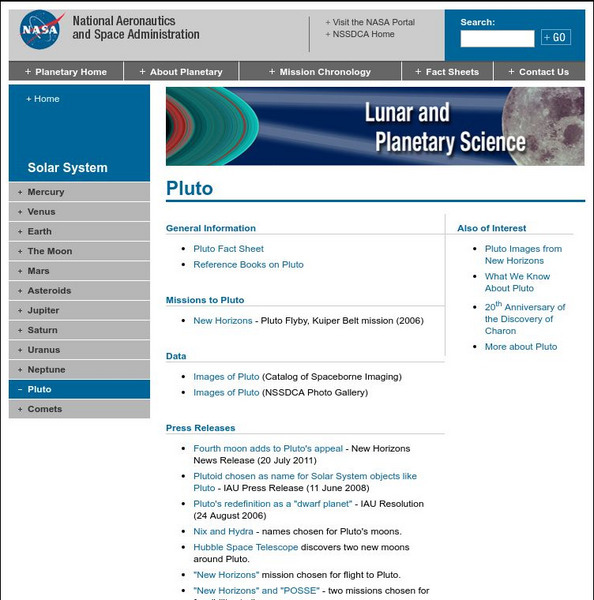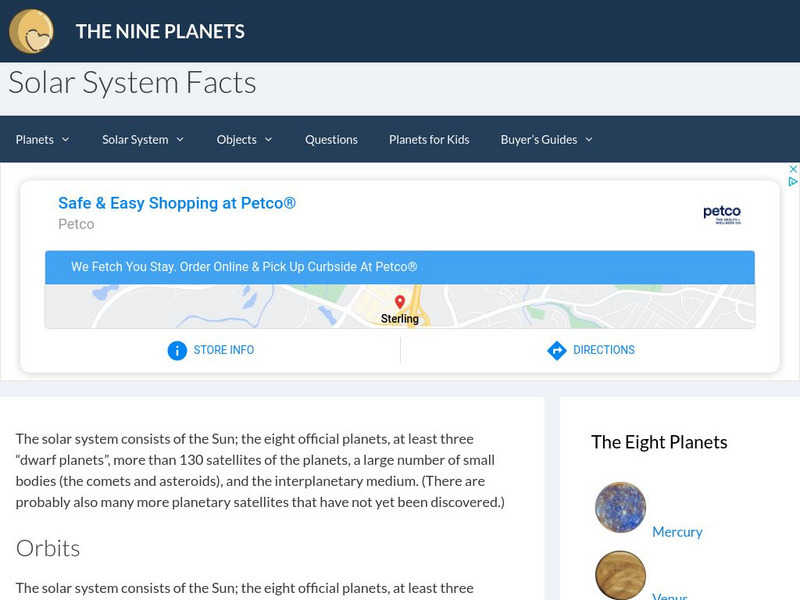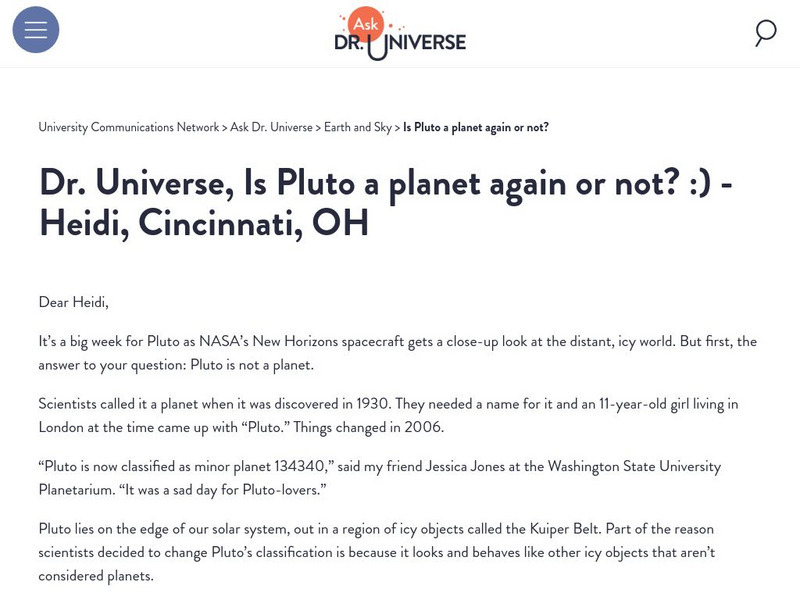NASA
Nasa Space Science Data Archive: Pluto
This site, which is provided by the National Space Science Data Center of NASA, is a site with detailed information about Pluto, including planned missions to explore the planet in greater detail.
University of Texas at Austin
The University of Texas Mc Donald Observatory: Pluto
Discover interesting information about Pluto, a member of the Kuiper Belt and no longer a planet since 2006.
NASA
Nasa: Planetary Data Sytem: Welcome to the Planets
Collection of images, with vocalized explanatory captions, of the planets acquired by NASA as part of its exploratory space programs.
California Institute of Technology
Cool Cosmos: Ask an Astronomer: Pluto
Visit this site and learn more about Pluto. Provides the answers to kids' most frequently asked questions.
Cosmos 4 kids
Cosmos4 Kids: Solar System: Pluto
Learn all about Pluto ..its discovery, basic facts, recognition as a planet, and most recently, its 'demotion' from a planet to a dwarf planet. The brief, to the point text makes this site most suitable for younger researchers.
NASA
Nasa: Space Place: Messenger: Planet Mass Comparison
Compare the masses of planets in this interactive animation. Simply pile a number of Earths on one side of the scale, to balance with the mass of one Jupiter. Then try this with all the planets.
Library of Congress
Loc: Poetry 180: Forgotten Planet
This poet reminisces about childhood as he listens to his daughter's lack of undertanding about the names of the all of the planets.
NASA
Nasa: Mission Science: What Is a Planet?
Find out about how planets have been classified historically, and what scientists use to study them.
NASA
Nasa: Planets in a Bottle
In this simple lesson, students grow yeast to learn how the climates on each of the nine planets would affect life.
Read Works
Read Works: Mission Pluto
[Free Registration/Login Required] An informational text about Pluto being classified as a dwarf planet. A question sheet is available to help students build skills in reading comprehension.
Cool Math
Coolmath: Science Monster: Pluto
A cool fact sheet about Pluto including a place for students to enter their weight on Earth to convert it to what it would be on Pluto.
Wikimedia
Wikipedia: Pluto
Wikipedia, a publicly-maintained encyclopedia, provides an article on the dwarf planet, Pluto, including images, physical characteristics, history of its naming, the planet/dwarf planet debate, and more.
Nine Planets
The Nine Planets: An Overview of the Solar System
A detailed overview of the history, mythology, and current scientific knowledge of each of the planets and moons in the solar system.
Science4Fun
Science4 Fun: Pluto
Learn fun facts and details about the atmosphere, geography, composition, and discovery of Pluto, a dwarf planet.
Other
University of Leicester: The Solar System
Resource explores the solar system, with an in depth discussion of each of the planets and their properties.
TeachEngineering
Teach Engineering: The Outer Planets
Students explore the outermost planets of our solar system: Saturn, Uranus and Neptune. They also learn about characteristics of Pluto and its interactions with Neptune. Students learn a little about the history of space travel as well...
Nine Planets
The Eight Planets: Just for Kids
Here is a clear, simple picture of the solar system. Click on the names of the planets to learn more about each. Clicking on underlined terms takes you to more and more detailed scientific information.
ClassFlow
Class Flow: What Happened to Pluto?
[Free Registration/Login Required] This flipchart was created to teach students about Pluto and the recent news of it NOT being a planet (officially). Lots of ways for students to vote on why as well as discussions about what other facts...
Famous Scientists
Famous Scientists: Clyde Tombaugh
Find out about Clyde Tombaugh, the scientist who discovered the dwarf planet Pluto in 1930, and also discovered a number of asteroids.
Washington State University
Washington State University: Ask Dr. Universe: Is Pluto a Planet Again or Not?
Dr. Universe answers this question after talking with WSU's Katie Cooper. Katie is an expert in the geology of Earth and objects in outer space.
Famous Scientists
Famous Scientists: Michael E. Brown
This article discusses the life and scientific discoveries of Michael E. Brown. Learn how he is credited with downgrading Pluto from a planet to dwarf planet.
Space Telescope Science Institute
Hubble Site: Solar System Images
A listing of clickable images of objects in the Solar System from the Hubble telescope that includes the following: Venus, Mars, Jupiter, Jupiter's satellites, Saturn, Saturn's rings and satellites, Uranus, Uranus' rings and satellites,...
California Institute of Technology
The Discovery of Eris, the Largest Known Dwarf Planet
Until the discovery of Eris, Pluto was known as the largest Keiper belt object. This dwarf planet has replaced Pluto in size and is accompanied by a satellite that has been given the name Dysnomia. Learn about this distant world here...
A&E Television
History.com: The Space Race: Interactive Universe
A virtual journey through space offers photos and facts about Earth and its neighboring planets, comets, other celestial bodies of the Solar System, and the Milky Way and Andromeda galaxies.


















